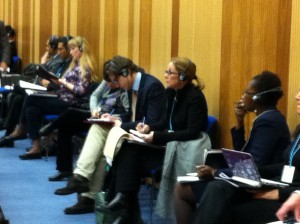By Philip L. Watson
The evolution of the United Nations Arms Trade Treaty (ATT) from the “Firearms Protocol” and the “Programme of Action on Small Arms and Light Weapons” (PoA) for more than a decade continues despite the failure to reach agreement on the ATT this last July.
On October 15-19 the “Conference of the Parties to the United Nations Convention against Transnational Organized Crime” was held in Vienna Austria. IAPCAR’s Julianne Versnel and Alan Gottlieb attended the meeting via the WFSA on behalf of the Second Amendment Foundation. In the past, the UN’s “Conference of Parties” has served as a bureaucratic and educational platform supporting the Firearms Protocol, the Programme of Action, and the ATT.
At this meeting the “illegal” trade in small arms used for sport and/or self-defense was lumped in with various forms of crime such as human trafficking, drug trafficking, terrorism, counterfeiting, and organized crime.
A resolution was passed to continue the working group’s study and recognizing the legitimacy of firearms with sporting uses.
Mexico was apparently vehement on not mentioning firearms in civilian possession. Rather, their preferred method of mentioning firearms replaces “civilian possession” with “lawful use.” This proposed verbiage would presumably give governments and the UN more authority to limit civilian use of firearms.
The Mexican delegation also hosted a side event titled “Arms Trade Treaty, Firearms Protocal and Small Arms Programme of Action: Three essential components of effective firearms control. What options for synergies?” The main stated goal of the meeting was to “establish synergies” among the UN Programme of Action on Small Arms, the Firearms Protocol, and the UN Arms Trade Treaty. During the meeting a representative from a different group advised against changing terms and contexts that had already been negotiated.
At the main meeting, a representative from Russia questioned the motives, funding sources, and accuracy of the so called “Small Arms Survey,” a yearly publication distributed by the Graduate Institute of International and Development Studies (GIIDS) and Cambridge Press. The 366 page tome supposedly focuses on “illicit trafficking of small arms;” however, the ‘survey’ frequently veers far off track highlighting domestic laws and issues unrelated to international affairs or the UN. The publication serves as a clear blueprint and source of skewed data for a political agenda against the civilian use of firearms.
In addition to the “Small Arms Survey,” GIIDS also frequently produces “Research Notes” and “Issue Briefs” for dissemination at UN meetings. These smaller, pithier handouts are distributed at meetings backing up the yearly ‘Survey’ to constantly reiterate their request for increased regulation on civilian arms.
The UN ATT is likely to resurface again. Overall, the goals of our opposition have not, and will not change. In the defense of the human right of self-defense, IAPCAR will continue to monitor these events closely.




